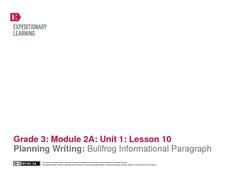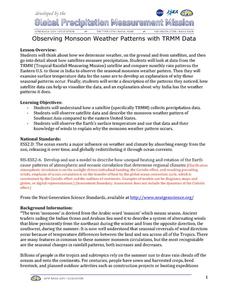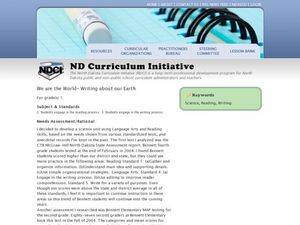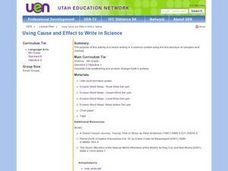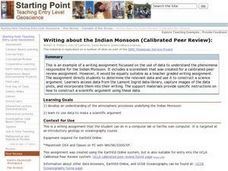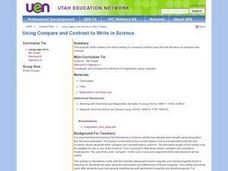EngageNY
Planning Writing: Bullfrog Information Paragraph
Lesson ten in this unit for the book Bullfrogs at Magnolia Circle, prepares third graders to begin writing an informational paragraph about the adaptations of bullfrogs. First, young writers work either independently or in pairs to...
ReadWriteThink
Persuasive Essay: Environmental Issues
Young environmentalists learn how to craft a persuasive essay about an environmental issue they consider important. After studying the components of a persuasive essay and examining a student model, writers brainstorm possible topics and...
Curated OER
A Seashell Lesson: Writing for Detail and the Scientific Process
Practice descriptive language in this lesson plan, which prompts elementary and middle schoolers to write detailed descriptive sentences describing a seashell. They write a description of a shell, create an illustration, and other...
Curated OER
Don't Let the Earth Down
Writing a persuasive argument starts with a clear thesis. Using this resource, your class will write a persuasive paper on a conservation issue. They will then transform their argument into a 30-second public service announcement. If...
Curated OER
Note Taking And Skills And Lab Reports
Students perform simple and fun experiments to use the scientific method, take careful notes, and write a lab report. They first make and test a hypothesis about how many drops of water they can fit on the face of a penny and then test...
NASA
Observing Monsoon Weather Patterns with TRMM Data
Follow a fabulous slide show on how monsoons form and how satellite technology is being used to observe the phenomena, explaining why they occur. Afterward, visit the TRMM (Tropical Rainfall Measuring Mission) website to access actual...
Consortium for Ocean Science Exploration and Engagement (COSEE)
Understanding the Food Web
Building on prior knowledge of the pervious lesson in the series, pupils explain the previous lesson to each other. Then they write a simple guide for a young child to read on the same topic.
Curated OER
Don't Let the Earth Down
Although recycling is definitely beneficial, reducing our waste and conserving our natural resources should really be the focus of environmentalists. Encourage the future generation to create a public service announcement about a...
Curated OER
An Animal Report
Third graders create reports in the fashion of small books. They write brief descriptions for a variety of topics and answering a variety of questions. They create a picture book for their individual animals. They utilize basic computer...
Curated OER
Using Description to Write in Science
Fifth graders use science process and thinking skills. They communicate effectively using science language and reasoning.
Kenan Fellows
Determining Stream Health by the Diversity and Types of Benthic Organisms
How diverse are the benthic organisms found in local streams? Using the information learned in previous lessons on identification of macroinvertebrates and on calculating stream index values, groups determine the health of local streams....
Nemours KidsHealth
Human Body Series: Immune System
When you work with school children, teaching about immunity and illness prevention is a priority! This approach includes a discussion, kid-friendly online articles, a creative writing assignment, and a quiz on the role of leukocytes and...
Sargent Art
Protect Our Marine Life
Encourage water conservation and boost art skills with a hands-on activity that challenges young painters to create a scene highlighting marine life. Using oil pastels, scholars draw an underwater scene and write a tip for viewers to...
Serendip
Homeostasis, Negative Feedback, and Positive Feedback
So many bodily activities depend on homeostasis! Give learners a solid background to understand the basic process of the human body. Scholars first examine negative feedback loops contributing to body temperature regulation and then a...
Curated OER
The Stroop Effect
Students explore the specific areas of the brain that process different types of information. They examine processing conflicts. Students participate in a hands-on minds-on activity using the Stroop Effect. They design psychological...
Curated OER
Cancer and the Cell Cycle - Biology Teaching Thesis
Identify the different stages of mitosis and what occurs in each stage with a straightforward biology lesson. Young scientists identify the importance of the cell cycle control in maintaining homeostasis, and then match the correct stage...
Curated OER
What Does Earth Day Mean? - Biology Teaching Thesis
Young scholars possible sources of water pollution, and explain the effects that water pollution can have on the food on the food chain. They Name human and other animal (i.e. fish) illnesses that can be contracted from drinking polluted...
Curated OER
Earth Day Unit Plan: Pollution in the Anacostia River - Biology Teaching Thesis
Sixth graders are able to explain that there are pollutants in the Anacostia River, what these pollutants can cause, and how to prevent further pollution. They examine the impacts that the pollutants of the Anacostia River could have on...
Curated OER
We are the World - Writing about our Earth
First graders write facts about the Earth. In this Earth lesson, 1st graders discuss natural resources, recycling, and how to keep the Earth clean. They work in groups to create a small book with 3-5 facts about the Earth's environment.
Curated OER
Using Cause and Effect to Write in Science
Fifth graders brainstorm processes or forces that cause Earth's surface to be changed.
Curated OER
Writing About the Indian Monsoon (Calibrated Peer Review):
Students develop an understanding of the atmospheric processes underlying the Indian Monsoon. They explore the use data to make a scientific argument. They listen to lecture on atmospheric circulation processes.
Curated OER
Writing about the climate
Young scholars research the contributing factors to the Earth's paleoclimate. They determine the relevant climate data and use it to construct a science argument. In the process, they access data, capture images of the data plots, and...
Curated OER
Using Compare and Contrast to Write in Science
Fifth graders investigate and compare the behavior of magnetism using magnets. In this physics lesson, 5th graders write about the similarities and differences of a variety of magnet types.
Curated OER
Using a Graphic Organizer to Research a Question
Is Pluto still a planet? Using this popular question, kids are introduced to graphic organizers as a writing tool. As a class, they watch a demonstration on how to use them and work together with a partner to research whether Pluto is a...


